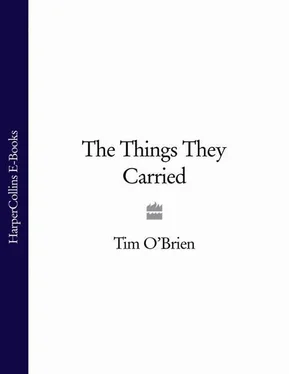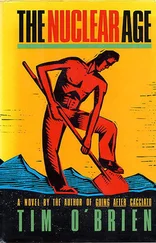The Things They Carried
Tim O’Brien

Copyright Copyright Author’s Note THE THINGS THEY CARRIED LOVE SPIN ON THE RAINY RIVER ENEMIES FRIENDS HOW TO TELL A TRUE WAR STORY THE DENTIST SWEETHEART OF THE SONG TRA BONG STOCKINGS CHURCH THE MAN I KILLED AMBUSH STYLE SPEAKING OF COURAGE NOTES IN THE FIELD GOOD FORM FIELD TRIP THE GHOST SOLDIERS NIGHT LIFE THE LIVES OF THE DEAD Keep Reading Acknowledgments About the Author Praise By Tim O'Brien About the Publisher
Of these stories, five first appeared in Esquire: ‘The Things They Carried’, ‘How to Tell a True War Story’, ‘Sweetheart of the Song Tra Bong’, ‘The Ghost Soldiers’ and ‘The Lives of the Dead’. ‘Speaking of Courage’ was first published in The Massachusetts Review, then later, in a revised version, in Granta. ‘In the Field’ was first published in Gentlemen’s Quarterly. ‘Style’, ‘Spin’ and ‘The Man I Killed’ were first published, in different form, in The Quarterly. ‘The Things They Carried’ appeared in The Best American Short Stories 1987. ‘Speaking of Courage’ and ‘The Ghost Soldiers’ appeared in Prize Stories: The O. Henry Awards (1978 and 1982). ‘On the Rainy River’ first appeared in Playboy.
The author wishes to thank the editors of those publications and to express gratitude for support received from the National Endowment for the Arts.
Fourth Estate
An Imprint of HarperCollins Publishers 1 London Bridge Street London SE1 9GF
Flamingo is a registered trade mark of HarperCollins Publishers Limited
www.harpercollins.co.uk
Published by Flamingo 1991
First published in Great Britain by Collins 1990
Copyright © Tim O’Brien 1990
The Author asserts the moral right to be identified as the author of this work
Author photograph © Jerry Bauer
All rights reserved under International and Pan-American Copyright Conventions. By payment of the required fees, you have been granted the non-exclusive, non-transferable right to access and read the text of this e-book on-screen. No part of this text may be reproduced, transmitted, downloaded, decompiled, reverse engineered, or stored in or introduced into any information storage and retrieval system, in any form or by any means, whether electronic or mechanical, now known or hereinafter invented, without the express written permission of HarperCollins e-books.
Source ISBN: 9780006543947
Ebook Edition © AUGUST 2010 ISBN: 9780007386802
Version: 2015-07-03
This book is sold subject to the condition that it shall not, by way of trade or otherwise, be lent, re-sold, hired out or otherwise circulated without the publisher’s prior consent in any form of binding or cover other than that in which it is published and without a similar condition including this condition being imposed on the subsequent purchaser.
This book is lovingly dedicated to
the men of Alpha Company, and in particular to
Jimmy Cross, Norman Bowker, Rat Kiley, Mitchell Sanders, Henry Dobbins, and Kiowa
Cover Page
Title Page The Things They Carried Tim O’Brien
Copyright
Author’s Note
THE THINGS THEY CARRIED
LOVE
SPIN
ON THE RAINY RIVER
ENEMIES
FRIENDS
HOW TO TELL A TRUE WAR STORY
THE DENTIST
SWEETHEART OF THE SONG TRA BONG
STOCKINGS
CHURCH
THE MAN I KILLED
AMBUSH
STYLE
SPEAKING OF COURAGE
NOTES
IN THE FIELD
GOOD FORM
FIELD TRIP
THE GHOST SOLDIERS
NIGHT LIFE
THE LIVES OF THE DEAD
Keep Reading
Acknowledgments
About the Author
Praise
By Tim O'Brien
About the Publisher
This is a work of fiction. Except for a few details regarding the author’s own life, all the incidents, names and characters are imaginary.
FIRST LIEUTENANT JIMMY CROSS carried letters from a girl named Martha, a junior at Mount Sebastian College in New Jersey. They were not love letters, but Lieutenant Cross was hoping, so he kept them folded in plastic at the bottom of his rucksack. In the late afternoon, after a day’s march, he would dig his foxhole, wash his hands under a canteen, unwrap the letters, hold them with the tips of his fingers, and spend the last hour of light pretending. He would imagine romantic camping trips into the White Mountains in New Hampshire. He would sometimes taste the envelope flaps, knowing her tongue had been there. More than anything, he wanted Martha to love him as he loved her, but the letters were mostly chatty, elusive on the matter of love. She was a virgin, he was almost sure. She was an English major at Mount Sebastian, and she wrote beautifully about her professors and roommates and midterm exams, about her respect for Chaucer and her great affection for Virginia Woolf. She often quoted lines of poetry; she never mentioned the war, except to say, Jimmy, take care of yourself. The letters weighed 10 ounces. They were signed Love, Martha, but Lieutenant Cross understood that Love was only a way of signing and did not mean what he sometimes pretended it meant. At dusk, he would carefully return the letters to his rucksack. Slowly, a bit distracted, he would get up and move among his men, checking the perimeter, then at full dark he would return to his hole and watch the night and wonder if Martha was a virgin.
The things they carried were largely determined by necessity. Among the necessities or near-necessities were P-38 can openers. pocket knives, heat tabs, wristwatches, dog tags, mosquito repellent, chewing gum, candy, cigarettes, salt tablets, packets of Kool-Aid, lighters, matches, sewing kits, Military Payment Certificates, C rations, and two or three canteens of water. Together, these items weighed between 15 and 20 pounds, depending upon a man’s habits or rate of metabolism. Henry Dobbins, who was a big man, carried extra rations; he was especially fond of canned peaches in heavy syrup over pound cake. Dave Jensen, who practiced field hygiene, carried a toothbrush, dental floss, and several hotel-sized bars of soap he’d stolen on R&R in Sydney, Australia. Ted Lavender, who was scared, carried tranquilizers until he was shot in the head outside the village of Than Khe in mid-April. By necessity, and because it was SOP, they all carried steel helmets that weighed 5 pounds including the liner and camouflage cover. They carried the standard fatigue jackets and trousers. Very few carried underwear. On their feet they carried jungle boots – 2.1 pounds – and Dave Jensen carried three pairs of socks and a can of Dr Scholl’s foot powder as a precaution against trench foot. Until he was shot, Ted Lavender carried six or seven ounces of premium dope, which for him was a necessity. Mitchell Sanders, the RTO, carried condoms. Norman Bowker carried a diary. Rat Kiley carried comic books. Kiowa, a devout Baptist, carried an illustrated New Testament that had been presented to him by his father, who taught Sunday school in Oklahoma City, Oklahoma. As a hedge against bad times, however, Kiowa also carried his grandmother’s distrust of the white man, his grandfather’s old hunting hatchet. Necessity dictated. Because the land was mined and booby-trapped, it was SOP for each man to carry a steel-centered, nylon-covered flak jacket, which weighed 6.7 pounds, but which on hot days seemed much heavier. Because you could die so quickly, each man carried at least one large compress bandage, usually in the helmet band for easy access. Because the nights were cold, and because the monsoons were wet, each carried a green plastic poncho that could be used as a raincoat or groundsheet or makeshift tent. With its quilted liner, the poncho weighed almost two pounds, but it was worth every ounce. In April, for instance, when Ted Lavender was shot, they used his poncho to wrap him up, then to carry him away across the paddy, then to lift him into the chopper that took him away.
Читать дальше













